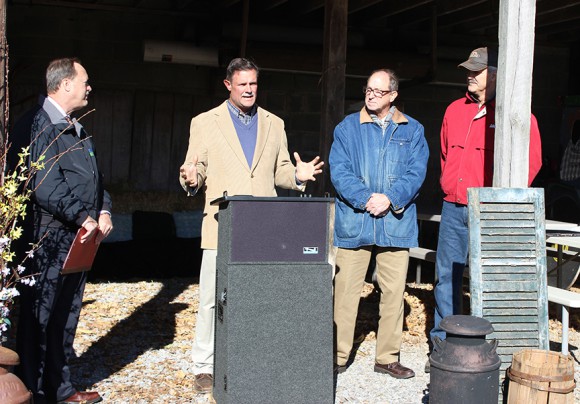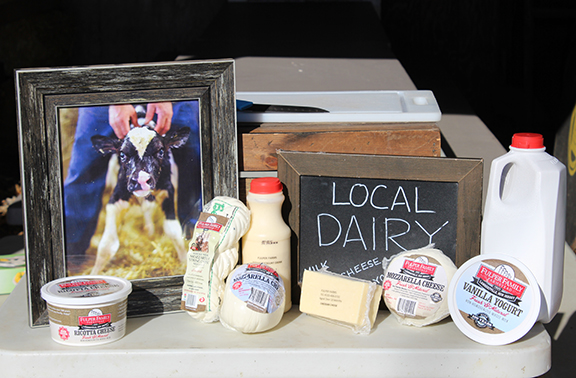
L-R: Howard Henderson, USDA; Dave Specca, Rutgers EcoComplex; Douglas Fisher, New Jersey Secretary of Agriculture; and Rob Fulper III, Fulper Family Farm. Photo: Cynthia O’Grady.
The Rutgers EcoComplex was awarded a Rural Business Development Grant of $19,000 by the USDA Rural Development Office to perform a technical and economic feasibility study of co-digestion of food waste and dairy manure at Fulper Family Farms, located in West Amwell Township.
Announcing the grant was Howard Henderson, the state director of USDA Rural Development Office, who was joined by New Jersey Secretary of Agriculture Douglas Fisher at Fulper Farm on Nov. 23 to also award a $250,000 USDA grant to Fulper Family Farms to expand its dairy product line.
While the ultimate goal is to spur rural development and job creation in Hunterdon County, the grant to the EcoComplex, a unit of the New Jersey Agricultural Experiment Station (NJAES), will study the feasibility of mixing food waste and animal manure in an anaerobic digester to produce renewable energy in the form of biomethane, explained Dave Specca, assistant director of the EcoComplex, who accepted the grant on behalf of Rutgers.
A recent “Assessment of Biomass Energy Potential” performed by the Rutgers EcoComplex, found that New Jersey residents dispose of more food waste per square mile than any other state in the U.S., most of which ends up in landfills.
This waste could be diverted from landfills and turned into clean energy through anaerobic digestion to produce electricity and transportation fuel as well as fertilizer and organic compost, stated Specca.
At the same time, there is a strong interest among dairy and horse farms in New Jersey to use their animal manure for energy using the same technology but unfortunately, most of these farms are too small to justify the cost.

In addition to regular milk production, Fulper Farms offer a number of value-added products like cheese and yogurt. Photo: Cynthia O’Grady.
“By combining the two organic sources (food waste and animal manure), called co-digestion, the digester produces more energy and the economics could look much better,” he added.
According to Serpil Guran, director of the Rutgers EcoComplex and principal investigator for the feasibility study, “This type of analysis is very important given the large initial investment that is needed for an anaerobic digester project, yet the economic and environmental benefit are very promising based on similar projects in upstate New York”.
The study by the EcoComplex will calculate the amount of food waste available from large food waste generators within a 25-mile radius of the Fulper Farm to see if the quantity is adequate to provide the needed material for the digester. As projected, the electricity produced would be used on-farm and sold to the grid, while the fertilizer and compost will be used on-farm to sustainably grow crops.
“This feasibility study can be used as a model for other farms looking to do similar projects throughout the State and we anticipate that there will be ample sources of food waste, based on our recent biomass assessment,” said Margaret Brennan, associate director for NJAES and co-author of the biomass assessment.
“This type of study is at the very core mission of the Rutgers EcoComplex, which strives to promote new technology to improve the environment and promote economic development,” she added.

